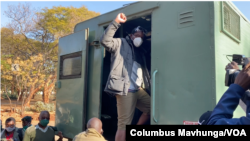Rights groups in Zimbabwe have denounced the High Court denying bail to journalist Hopewell Chin'ono, who is facing charges of stoking violence in advance of planned anti-government protests.
Security forces thwarted the July 31 protests against corruption and poverty, arresting Chin’ono and an opposition leader. South Africa is sending envoys to Zimbabwe to investigate reports of escalating rights abuses, which the government denies.
Supporters of Chin’ono fear his continued detention is a way for authorities to silence critical reporting against corruption.
“It’s a clear indication that Zimbabwean authorities are not prepared to have journalists who will expose government corruption and speaking truth to power," Robert Shivambu, Amnesty International’s spokesman in Southern Africa told VOA.
"The government of Zimbabwe should stop intimidating journalists like Hopewell Chin'ono and allow them to be able to do their job to expose corruption because this is good for the country, in fact, so that law enforcement agencies can be able to follow up what journalists like Hopewell are reporting - not criminalizing for exposing that.”
Zimbabwe’s High Court Thursday afternoon ruled against Chin’ono’s appeal for bail.
He’s been detained for three weeks on charges of stoking violence ahead of a planned protest last week that security forces stopped before it could begin.
Chin’ono is an outspoken critic of corruption, which the protest was to be against – along with the government’s handling of Zimbabwe’s imploding economy.
Speaking to reporters after Chin’ono was denied bail, Zimbabwe Lawyers for Human Rights’ Beatrice Mtetwa said it was clear that authorities want to silence critical voices.
“I think everybody knows what happens in Zimbabwe: those who say they are fighting for corruption are walking in the streets with their corrupt loot in the pocket and those saying you should be seen to be fighting corruption are getting more and more persecuted," she said.
Opposition politician Jacob Ngarivhume was arrested on the same charges as Chin’ono and also remains in prison.
Meanwhile, Zimbabwe authorities have released a “wanted list” of activists, and more than a dozen have gone into hiding.
Government spokesman Nick Mangwana rejected the idea that authorities are targeting activists or journalists.
“There is a journalist who happens to be an activist, whose actions may cross the boundaries of the law. They are not immune from prosecution, if they do that," he said. "If they incite and there is a law against incitement, the fact that they are a journalist does not give them immunity from that prosecution. That’s the difference. So, every other journalist who goes doing their business there is no problem. There is even no problem being an activist itself. But within the contest of breaking the law, the law will take its course.”
South African President Cyril Ramaphosa, the current chairperson of the Africa Union, has appointed special envoys to Zimbabwe to investigate the accusations.
Head of Human Rights Watch in Southern Africa Dewa Mavhinga says more is needed.
“We are calling for the Southern African Development Community and the African Union to urgently speak out on the abuses in Zimbabwe and urge President Mnangagwa to end repression and to promote human rights respect. Human rights in Zimbabwe should be guaranteed and should be respected," Mavhinga said.
Critics accuse Zimbabwe President Emmerson Mnangagwa of ruling the country with an iron fist, much like former President Robert Mugabe.
After Mugabe was removed in a 2017 coup, Mnangagwa vowed Zimbabwe would no longer be the dictatorship of his predecessor.
